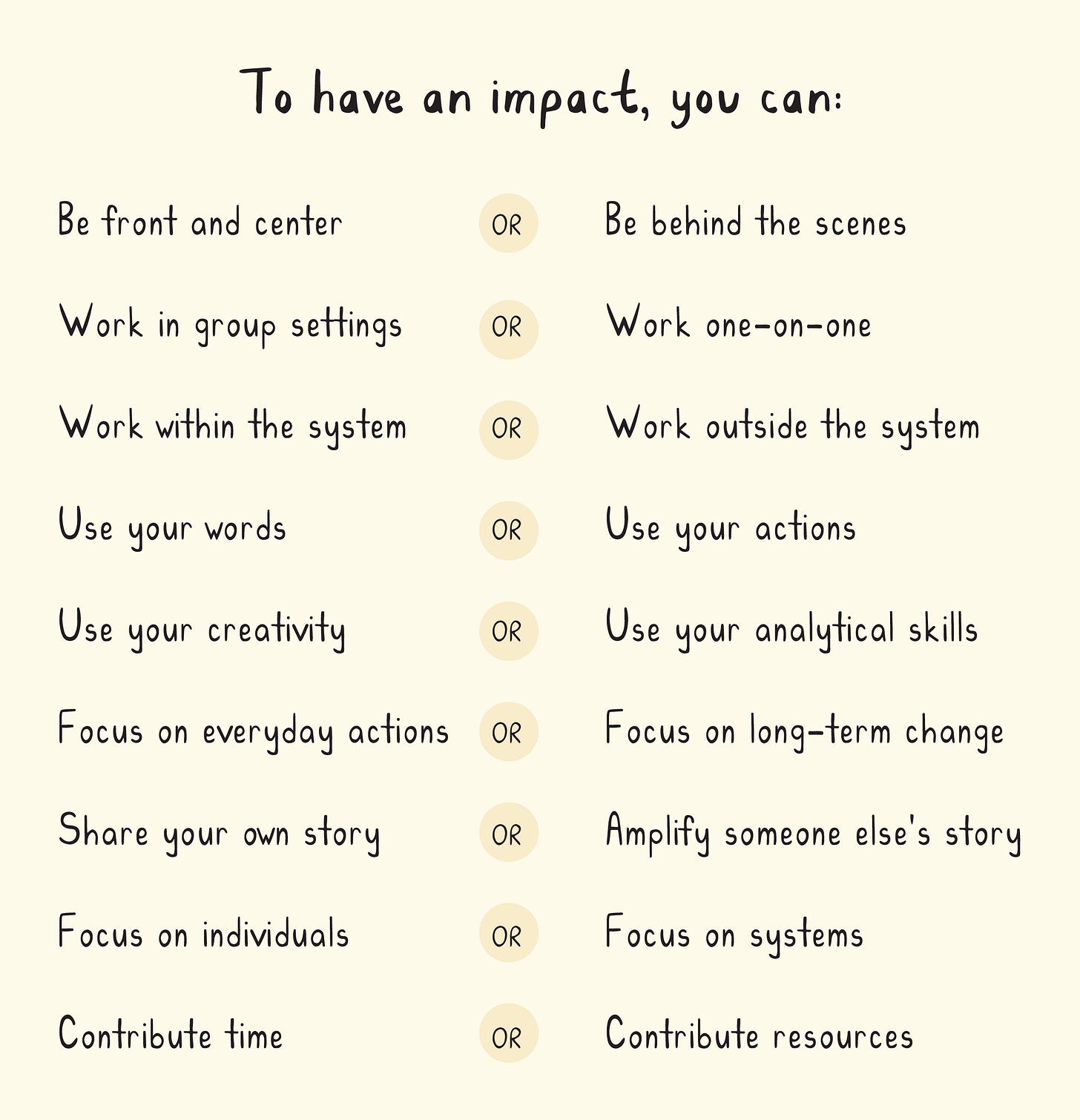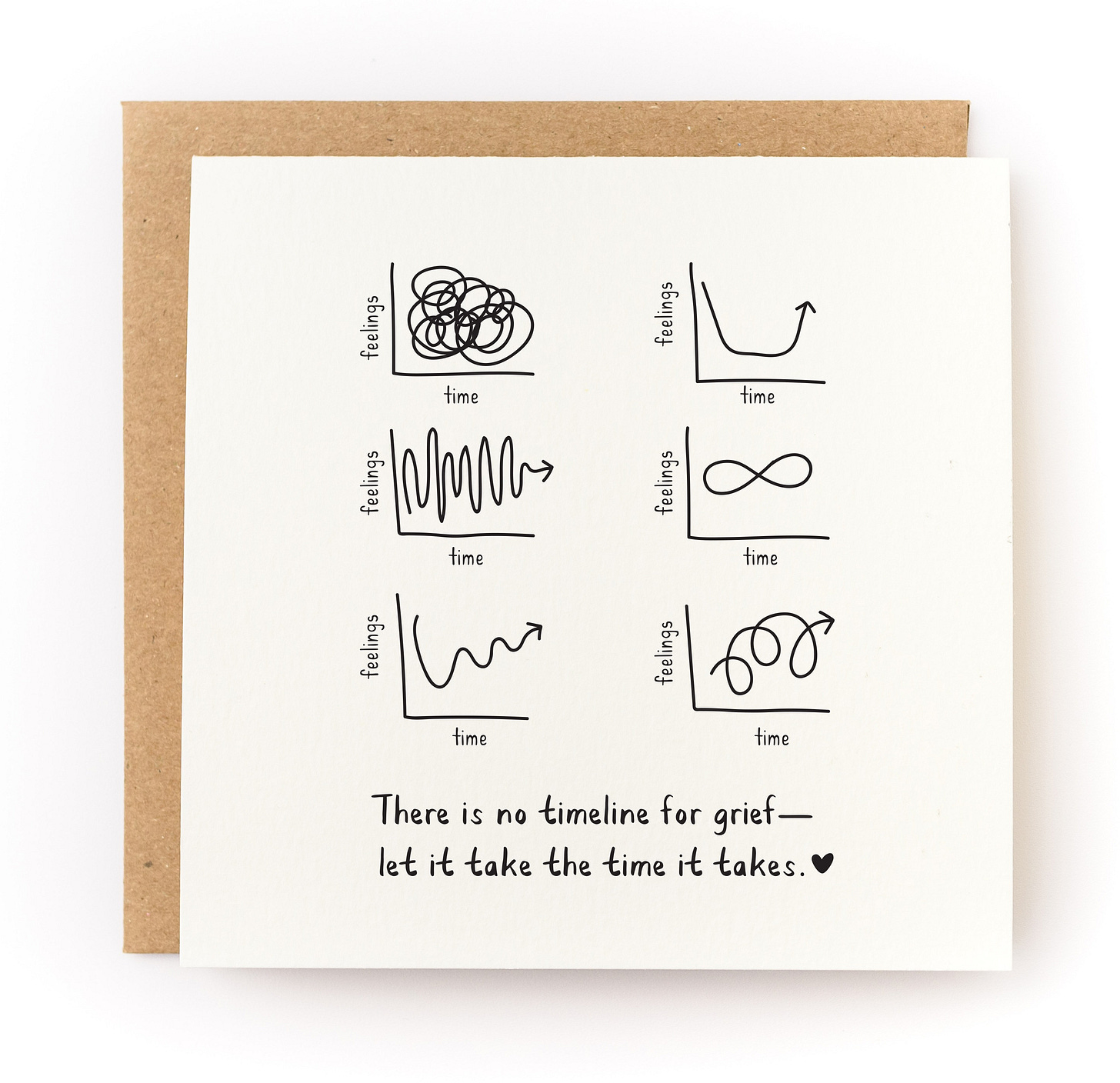What if I don't know how to have an impact?
I’ve been feeling overwhelmed by the rapid, devastating changes happening under this administration—the dismantling of rights, the gutting of social services, the deliberate destabilization of democracy. It feels like every day brings a new assault on our basic freedoms and humanity.
I feel stuck between the urgency to do something and the paralysis of not knowing what to do, and I find myself getting caught in the same cycle over and over—feeling like I need to do everything, and then, inevitably, doing nothing.
The truth is, I’ve never seen myself as a leader or an activist. When I was a kid, I was too nervous to even say "hi" back when someone greeted me. In college, I rarely asked questions or shared my opinions in class. And in every one of my jobs since, one consistent piece of feedback I received was that I needed to speak up in order to move up. And yet, time and time again I find myself unable to bring myself to talk in a roomful of people.
Although I've grown in confidence, I’m still quiet and introverted, with a healthy dose of social anxiety. I prefer to interact one-on-one or in small groups. I'm chronically indecisive, generally risk-averse, and a rule follower. I go out of my way to avoid conflict—not the typical stuff that we usually imagine change agents are made of. I've spent a lot of my life thinking that I couldn't be a leader, and by extension, that I couldn’t be a person who had an impact. So how do I, as the person I am, contribute in a meaningful way?
This question has resurfaced recently with increased urgency, and I find myself defaulting to feeling ill-equipped and helpless. But, as I remind myself, I know that there’s all kinds of work that need to be done — and just as many different ways to lead and participate in the world.
There are many different ways to have an impact.
There isn’t a single best way to make an impact. There are endless ways to lead and contribute, and we need every one of them.
You can choose the impact you want to have.
Rather than trying to fit into the mold of what a leader “should” be, I’ve learned to look at what is needed and tap into what I already have to offer. You can do the same — because yes, you do have valuable and relevant strengths, interests, and resources to contribute!
The point of this exercise is to remind ourselves how much we each can do, right now, just with the resources already we have and the people we already are. For example, here’s a quick brain dump of what this Venn Diagram looks like for me—definitely not exhaustive, just what I came up with in 10 minutes! It’s a reminder that the things we take for granted can actually be valuable resources and skills we can tap into.
I've tried door-to-door canvassing and phone banking—both stressed me out and I was honestly not very effective at either. I’m probably never going to be the one baking cookies for a fundraiser or driving anyone anywhere. But when I started filling out my Venn diagram, here’s what I found at the center:
Create and share illustrated educational resources
Write letters to prospective voters
Amplify small businesses, community initiatives, and opportunities through the Kwohtations social media and newsletter
Participate in online small business forums and mentor other new artists and entrepreneurs
Make posters and march in protests
Organize or donate to fundraising efforts—both through Kwohtations sales and personal funds
Offer pro bono design work
Support independent shops when I need a coffee, book, gift, etc.
Offer free or sliding-scale products and resources
Volunteer behind the scenes to support advocacy and community groups, e.g. helping with social media, events, data analysis, marketing materials etc.
Attend community board meetings
Continue to put inclusive, positive messages and products out into the world (thank you to everyone who is still reading this!)
In all of these endeavors, I may not be the one rallying the crowd, but I can always recruit a friend.
Making greeting cards might seem like a surprising vehicle for change, but it’s a way I can help someone feel comforted during a hard time or feel validated and supported in their feelings and choices. And to me, that’s pretty meaningful.
The impact you have will look different depending on your strengths, interests, and resources. And if you’re not sure what yours are, ask the people who know you well! I’m sure they can come up with some that you’ve forgotten or can’t see in yourself.
I hope this can be a reminder—to myself and to you—that we don’t have to do everything, but we all can do something.
What’s at the center of your Venn diagram? Share in the comments so we can all get ideas!








Hi Janine. Your post really resonates with me. It's easy to feel overwhelmed by everything happening, and I think many of us struggle with wanting to do more but not knowing exactly where to start. The small, quiet, consistent actions—like cultivating community, listening, having conversations, and sharing our stories—can be just as impactful. It's okay not to have all the answers, but your reflection and willingness to engage provide an invaluable perspective. Thank you for sharing it.
The list of doable-now things is so inspiring! I've also been keenly aware of my own lack of strategy. Both because I don't have an in depth understanding of any civic issue (not even one!) and I feel like I'm not a lawyer or a congresswoman or a famous person, so even if I devoted 30 days to reading up on everything I could on the judicial system or international relations or social contracts, how would that benefit anyone. Now I can use the Venn Diagram to identify what to do. I think the center of mine would be making a difference in the hyper local landscape in places that I already frequent, like my own neighborhood (: